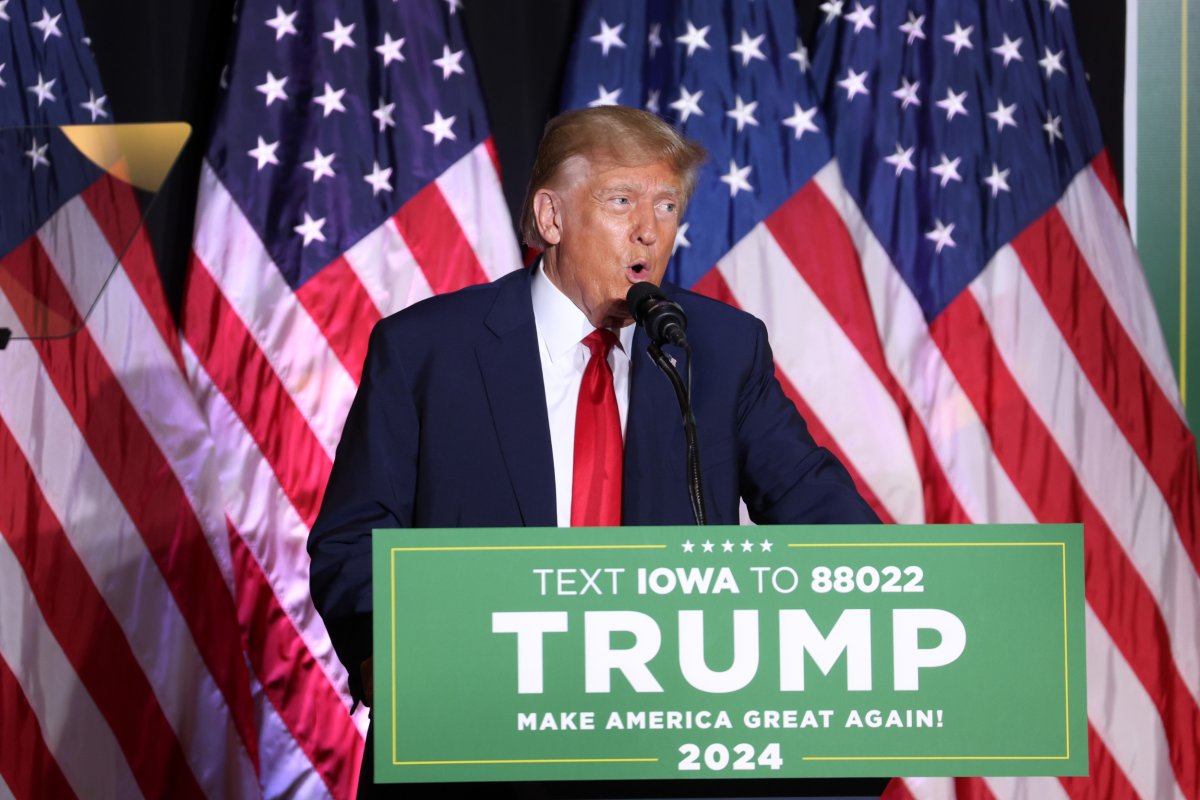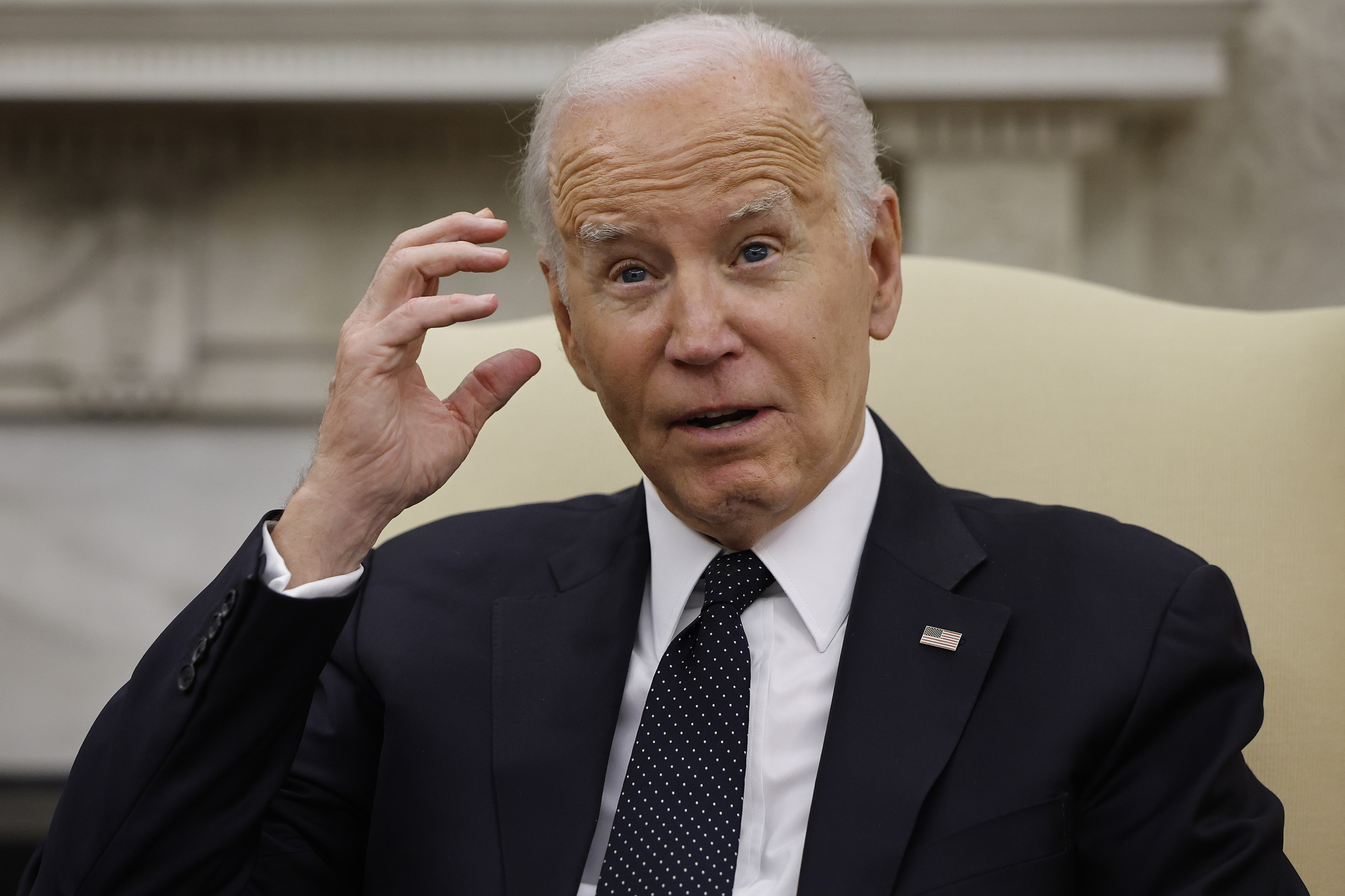When Donald Trump said he would not attend a key gathering of evangelical leaders in the early-voting state of Iowa next week, many national observers took it as a sign of disrespect toward a key voting bloc he needs to earn the GOP nomination for president.
To others, it could be seen as a smart, strategic play, helping him avoid hot-button topics like abortion that could harm the Republican nominee in a tight race against President Joe Biden.
On Tuesday, Bob Vander Plaats—CEO of anti-abortion evangelical organization the Family Leader—said Trump had told the group he would not be attending their gathering of various GOP candidates for president. He will be the only major presidential candidate not present.
While the Trump campaign chalked it up to a scheduling conflict, others saw it as a purposeful attempt to separate himself from other candidates, keeping them in the "other" drawer as the former president continues to campaign not as another candidate but as his party's presumptive nominee.

In June, Trump notably skipped out on Iowa Senator Joni Ernst's annual "Roast and Ride" event, one of the highest-profile events of the primary season, in favor of smaller "town hall"–style events on Fox News and smaller speaking engagements. Earlier this year, Trump held rallies in the Iowa cities of Des Moines and Council Bluffs. One day after Vander Plaats' event, he will be at a Fox News–sponsored town hall in Cedar Rapids with the network's pro-Trump host, Sean Hannity.
Some political observers saw the move as in line with his recent strategy for returning to the White House: By not appearing with his fellow candidates, Trump could be seen as maintaining the image of a distant front-runner, with one of his challengers vying for second place. Some speculated that Trump was "afraid" of being on the same stage as his next-closest challenger, Ron DeSantis, who has seen his appeal stagnate in national polling and is in desperate need of an edge over Trump.
Some could also see it as a sign that Trump is looking beyond the time-honored traditions of the Iowa caucuses, particularly after criticizing the state's popular Republican governor, Kim Reynolds, after she declined to endorse a candidate. This drew speculation that the move could "backfire" on Trump.
"Forest Gump says, 'stupid is as stupid does.' My Mom says don't call anyone, 'stupid.' So, I won't," Vander Plaats tweeted after Trump's Truth Social post criticizing the governor. "However, this isn't smart. Iowa is wide open."
Vander Plaats was unavailable when Newsweek reached out by email for comment.
Why is former President @realDonaldTrump attacking @KimReynoldsIA, the much beloved, super conservative, pro-life, Evangelical, and incredibly successful Governor of Iowa? This is a move that makes no sense to me and could really backfire on Trump heading towards the caucuses. pic.twitter.com/Gx5Yh7XdAY
— Joel C. Rosenberg (@JoelCRosenberg) July 11, 2023
But for Trump—who has been notably silent on his feelings about a national abortion ban—the decision to skip out on events like Vander Plaats' where he's unable to control the message could be seen as a strategic, long-term play to avoid broaching a topic polling shows is a losing issue in 2024.
While Trump is arguably the most wishy-washy candidate on a national abortion ban, other candidates in the race have expressed a willingness to support a 15-week national ban on abortions. While popular with the GOP, it's a losing issue with most voters: A 15-week national ban was favored by just 45 percent of voters nationally in a recent Associated Press/NORC Center for Public Affairs Research poll.
OPINION TODAY
— Opinion Today (@OpinionToday) July 12, 2023
Most Americans support legal abortion with some restrictions | Introducing the 2024 Patriot Index | Ramaswamy-mentum emerges among GOP electorate ... https://t.co/4WMx1cTPPb pic.twitter.com/IlkwFxZVO3
In Iowa, the abortion question has become inescapable after state lawmakers on Wednesday passed a six-week ban on abortions statewide. The last time a similar bill was signed into law—2018—the recently appointed Reynolds came within 3 points of losing a state Trump had carried by double digits just two years before.
By avoiding abortion, one expert said, Trump avoids hitching himself to a losing issue with the independent voters he needs to win while leaving Republican primary voters' understanding of his position open to interpretation.
"He may be a little bit concerned about being seen as extreme on the abortion issue," Timothy Hagle, a professor at the University of Iowa and an expert on Iowa politics, told Newsweek.
"Maybe he's looking forward to the general election, which to some extent is understandable if you're ahead 30 to 40 points. Now that can be a mistake, and [he needs to] be careful about that. But still, that may be where he's coming from," Hagle said.
Trump himself has largely declined to echo the rhetoric of the rest of the presidential field on abortion. While he has called himself "pro-life" and regularly taken credit for delivering the conservative Supreme Court supermajority that overturned Roe v. Wade—sending abortion legality back to the states—Trump has avoided discussing whether he would support a national ban.
Trump won the evangelical vote in 2016 and 2020. At this point, few believe he won't do so again in 2024, regardless of his nuanced position on abortion.
"All he needs to do is to say 'three Supreme Court justices' and 'Dobbs,' and they will fall in line and continue to overlook or forgive his secularism, his wishy-washy pro-life record, sexual promiscuity and lack of knowledge of the Bible," said Karen Kedrowski, director of the Carrie Chapman Catt Center for Women and Politics at Iowa State University.
"The other Republican candidates are here talking about God and religion, but only Pence has real evangelical bona fides," she told Newsweek. "Yet Pence doesn't have much traction given his actions on January 6—which were both brave and correct ones, by the way."
But Iowa's evangelical voters, Grinnell College professor Barbara Trish said, are also a strategy-minded group and are more likely to pick the candidate most likely to win in November 2024. Whatever Trump's reasoning, she told Newsweek, it's hard to accurately interpret whether skipping events with those voters is a strategic move or simply an unwillingness to engage in the ritualistic trials of the Iowa caucuses.
"I wouldn't ascribe too much rationality to Trump," Trish continued. "There may be some calculations, or he may just not feel like he wants to campaign in Iowa. That said, it's hard to imagine he's afraid of DeSantis in any way. As the former president routinely reminds us, DeSantis just isn't getting the sort of traction he needs among GOP activists."
Uncommon Knowledge
Newsweek is committed to challenging conventional wisdom and finding connections in the search for common ground.
Newsweek is committed to challenging conventional wisdom and finding connections in the search for common ground.
About the writer
Nick Reynolds is a senior politics reporter at Newsweek. A native of Central New York, he previously worked as a ... Read more
To read how Newsweek uses AI as a newsroom tool, Click here.






